Law & Politics
A Hard-Hitting New Senate Report Details How Art Dealers and Auction Houses Have Undermined US Sanctions Against Russia
Arkady and Boris Rotenberg spent $18.4 million in art after being put under sanctions by president Obama.
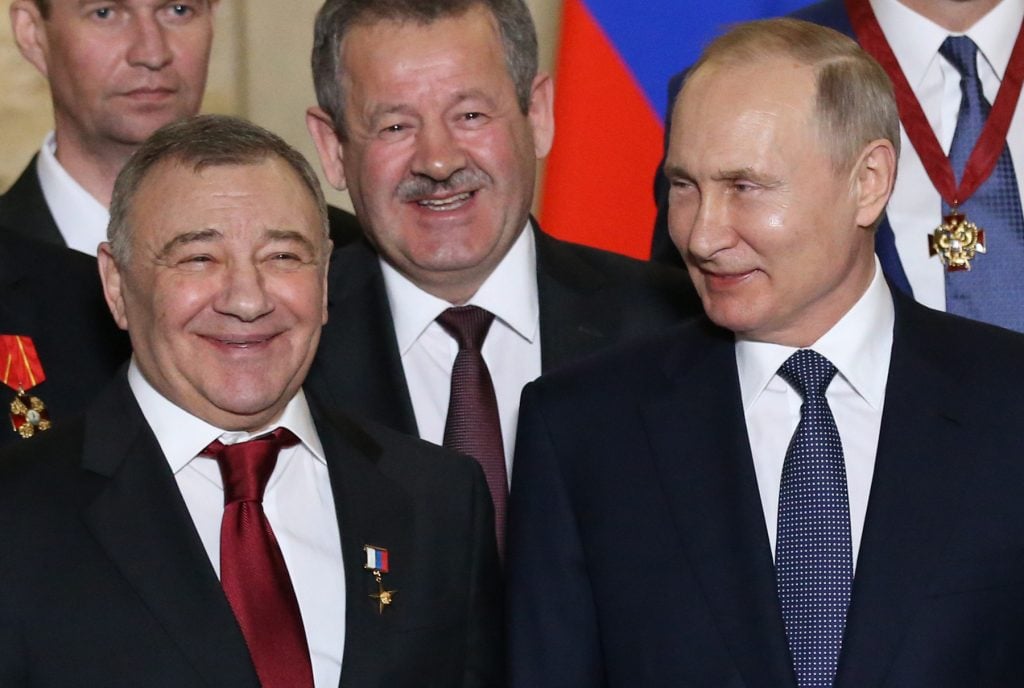
Arkady and Boris Rotenberg spent $18.4 million in art after being put under sanctions by president Obama.

Taylor Dafoe

A new congressional report reveals that two Russian oligarchs used the lax laws of the art market to evade U.S. sanctions.
Released today by the Senate’s Permanent Subcommittee on Investigations, the report alleges that billionaire brothers Arkady and Boris Rotenberg spent $18.4 million in U.S. funds on art—and upwards of $91 million in total—after sanctions were placed on them in 2014.
The Rotenbergs, lifelong friends of Vladimir Putin, were among 21 Russians placed under sanctions by president Obama in an effort to punish Putin for annexing Crimea.
Months after Obama’s executive order, the brothers dropped $6.8 million on 10 artworks at a Sotheby’s New York auction, including $2.9 million for Georges Braque’s Pichet et Journal and $1.1 million Marc Chagall’s Femme et Enfant, the report explains. Within weeks, they added a $600,000 archive relating to the work of Constructivist architect Yakov Georgievich Chernikhov through Bonhams New York, a $7.5 million for René Magritte’s La Poitrine through a private dealer, and $1.75 million for Jean-Paul Riopelle’s Ombre d’Espace through a private gallery.
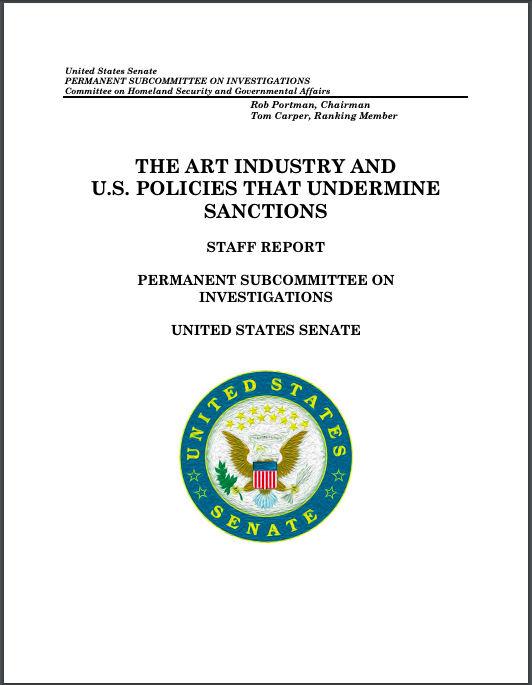
Cover page of the new report.
The 150-page bipartisan report, authored by senators Rob Portman from Ohio and Tom Carper from Delaware, details the ways in which the art world’s penchant for opacity undermine sanctions. It is illegal for U.S. companies to do business with sanctioned individuals, but because there are no strict laws in place requiring auction houses and dealers to do background checks on buyers, it’s easy for people like the Rotenbergs to move money around within the art world.
“It is shocking that U.S. banking regulations don’t currently apply to multi-million dollar art transactions, and we cannot let that continue,” senator Portman said in a statement. “The art industry currently operates under a veil of secrecy allowing art advisors to represent both sellers and buyers masking the identities of both parties, and as we found, the source of the funds. This creates an environment ripe for laundering money and evading sanctions.”
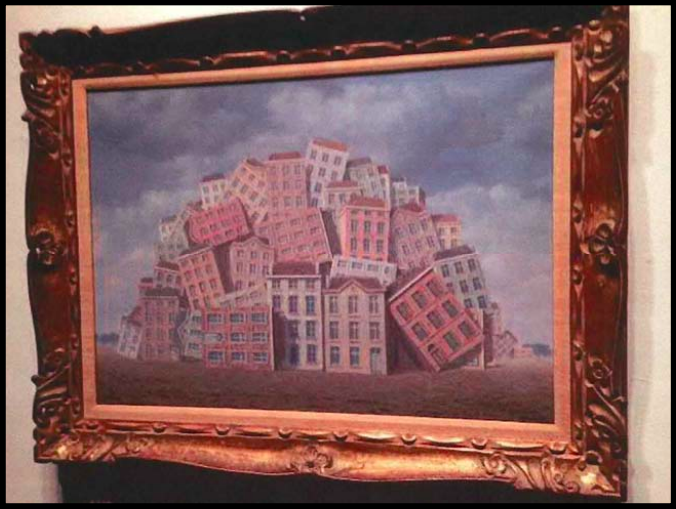
Photo of René Magritte’s La Poitrine included in “The Art Industry and U.S. Policies That Undermine Sanctions.”
Arkady Rotenberg, 68, made billions overseeing construction companies in Europe. One such company was chosen by Putin in 2015 to erect a multibillion dollar bridge connecting Russia with mainland Crimea. The two met as children when they joined the same judo class. They continue to practice together today.
Boris Rotenberg, 63, is the co-owner of the largest gas pipeline and owns a construction company that installs power lines and gas pipelines.
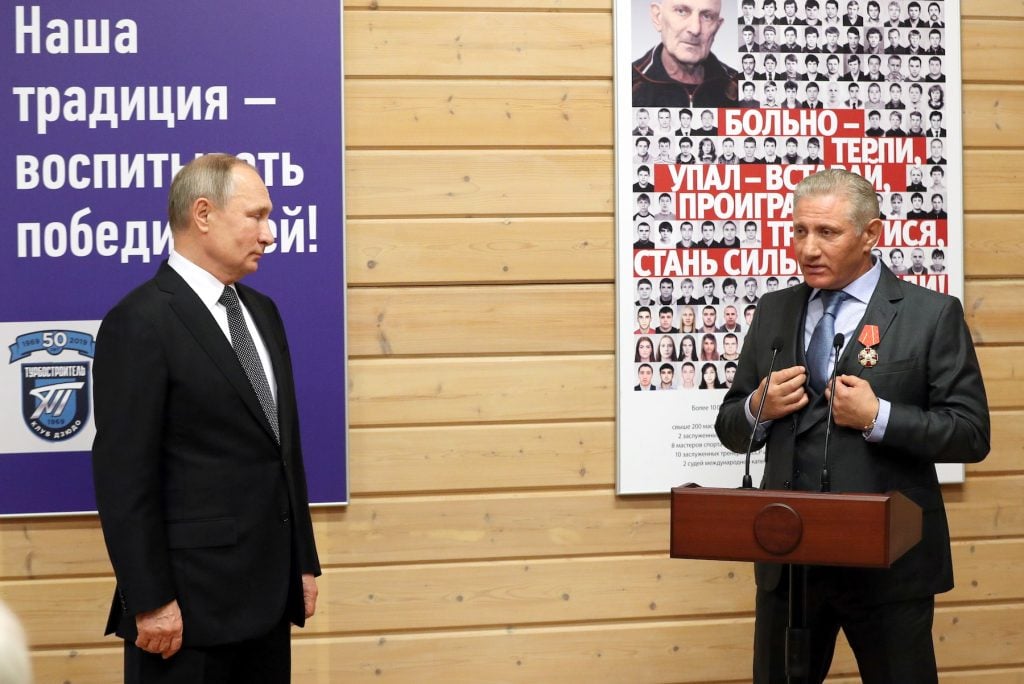
Russia’s president Vladimir Putin (left) and Boris Rotenberg, who was awarded the Alexander Nevsky order, during a ceremony to present state awards at the Turbostroitel judo club. Mikhail Tereshchenko/TASS Photo by Mikhail TereshchenkoTASS via Getty Images.
After being put under sanctions, their purchases at auction houses and galleries were made through a company owned by the Rotenbergs’ art advisor, Gregory Baltser. Other purchases were made through shell companies that have since been connected back to the brothers.
Baltser, a U.S. citizen living in Russia, refused to participate in the investigation. In a statement shared with the New York Times, he claimed that he has never “represented or transacted in any way with Boris or Arkady Rotenberg,” before adding that the list of sanctioned businesses does not have on it the shell companies allegedly used by the brothers.
“[Baltser’s company] had urged the Subcommittee not to make unfair and untrustworthy allegations on the basis of information from unconfirmed sources, and is deeply disappointed that the Subcommittee has chosen to do just that,” the statement said.
In addition to Sotheby’s and Bonhams, Christie’s and Phillips also did business with the Russian businessmen, per the report. When interviewed by investigators, each of the four auction houses denied knowing that the Rotenbergs were behind the sales. The companies were not accused of illegality in the document.
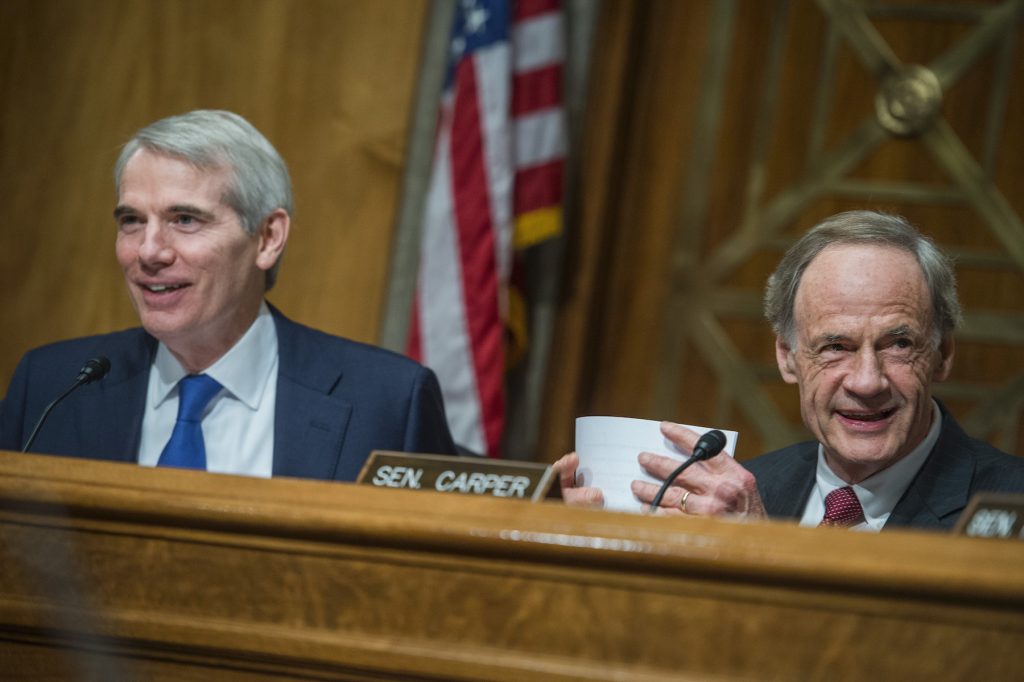
Rob Portman, Republican-Ohio (left), and Tom Carper, Democrat-Delaware, conduct a Senate Committee on Homeland Security and Governmental Affairs Permanent Subcommittee on Investigations hearing on May 25, 2017. Photo By Tom Williams/CQ Roll Call.
The report urges congress to amend the Bank Secrecy Act, a law meant to curb money laundering by requiring businesses to verify customers’ identities, by adding high-value art to the list of regulated transactions. It refers to the art market the “largest, legal unregulated industry in the United States.”
“Unfortunately, our failure to close these obvious loopholes make U.S. sanctions—an important national security tool—far less effective than they could be,” senator Carper said in a statement. “As Senator Portman and I have highlighted in this bipartisan report, there are reforms that we know can be put in place to ensure that wealthy bad actors cannot use valuable works of art to evade U.S. sanctions.”